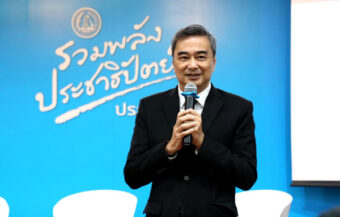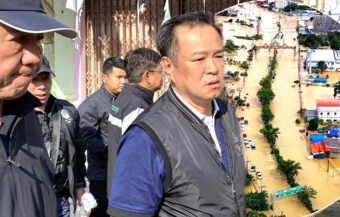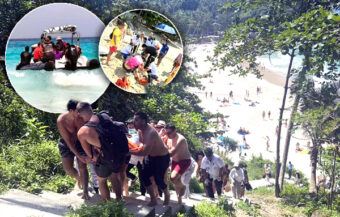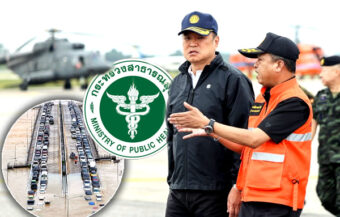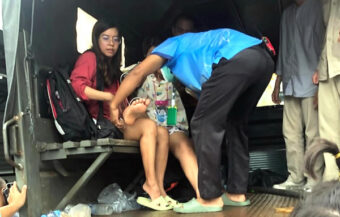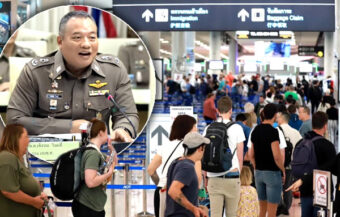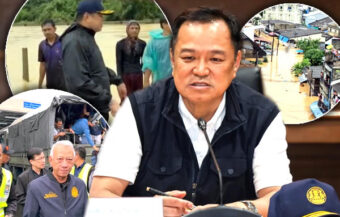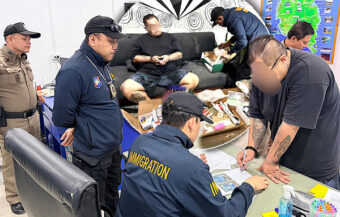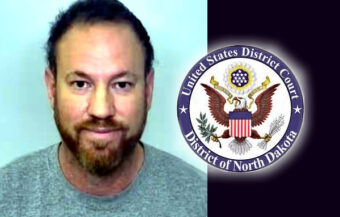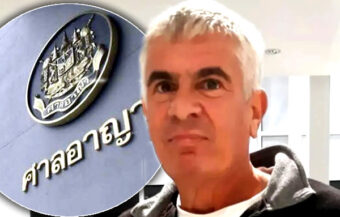Thai police are urgently probing claims that Belarusian model Vera Kravchova was lured to Thailand, trafficked into Myanmar, enslaved in a scam compound and died, as global outrage mounts over alleged organ harvesting and cross-border human trafficking.
On Sunday, a senior Royal Thai Police officer confirmed that Thai authorities are urgently verifying reports that a Belarusian woman vanished from Thailand and was trafficked into Myanmar. Police Major General Chaturaphat Piromkaew said Police Chief General Kittirat Phanphet has ordered the case to be treated as a top priority. Belarusian officials are reportedly working with Myanmar’s junta for details on 26-year-old model Vera Kravchova, whose family say she was enslaved in a Burmese scam compound and later cremated.
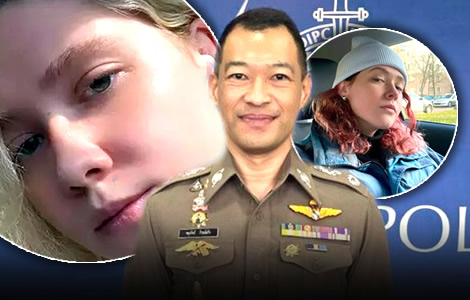
Police in Thailand have not yet confirmed whether a Belarusian woman was deceived into coming to Thailand, trafficked to Myanmar, and murdered. However, the Royal Thai Police are working urgently with the Ministry of Foreign Affairs and Myanmar authorities to uncover the truth behind the case.
The investigation concerns 26-year-old Belarusian model Vera Kravchova. She vanished after accepting a modelling job offer in Bangkok. Her family now claims she was abducted, trafficked to a scam compound in Myanmar, enslaved, and later died. It is not clear how. Reports also suggest her organs were harvested before her cremation. Those claims, though unverified, have caused global alarm.
On October 19, Police Major General Chaturaphat Piromkaew, Commander of the Foreign Affairs Division and Deputy Spokesperson for the Royal Thai Police, addressed the growing controversy. He said the police are aware of the reports and are taking urgent steps to establish the facts.
Thai police open cross-border enquiries to confirm reports Belarusian model died in Burmese scam camp
He explained that investigators are working closely with the Ministry of Foreign Affairs and Myanmar’s security agencies. The goal, he said, is to verify every detail and confirm whether the reports of Kravchova’s death are accurate.
According to early accounts, Kravchova disappeared on September 12 after attending what she believed was a legitimate job interview in Bangkok. Days later, her passport and phone were reportedly confiscated. Witnesses claim she was moved across the border into northern Myanmar, a region long known for its scam centres.
Once inside, she was allegedly forced to work under militia supervision. Victims in such camps are often compelled to carry out online scams and romance fraud. They work long hours under threat of violence. Some who resist disappear entirely.
International reports claim that Kravchova’s family later received ransom demands. One message asked for half a million US dollars for her body’s release. When no payment came, they were told she had been cremated. Russian and Belarusian media later repeated claims that her organs had been removed before cremation.
Belarus urges restraint as investigators look into claims of trafficking, murder and organ harvesting
The Belarusian government has urged restraint. Foreign Minister Sergei Aleinik said the investigation is continuing and warned against sensationalised coverage.
The Belarusian ambassador in Thailand, Vladimir Borovikov, confirmed that his embassy is cooperating with both Thai and Myanmar authorities. He said his office is working to track Kravchova’s final movements and verify the reports directly.
The envoy also urged Belarusian citizens to be cautious about foreign job offers, especially those promoted online without legal documentation. He said too many young people fall victim to criminal recruiters who promise glamour and high pay abroad but deliver only captivity.
This is not an isolated story. In a separate case, Russian model Dashinima Ochirnimayeva, aged 24, was trafficked to Myanmar under similar circumstances but later rescued. She reported being forced to work in cyber fraud and described daily beatings and threats.
Human trafficking crisis deepens as UN warns over 120,000 victims trapped in Myanmar’s scam compounds
Human rights groups say the Kravchova case exposes a regional crisis. The United Nations estimates that more than 120,000 people remain trapped in scam compounds in Myanmar. Many are forced to defraud victims online. Others are beaten, starved, or sold from one camp to another.
Police in Thailand insist they are intensifying efforts to stop trafficking across the border. Major General Chaturaphat said the order comes directly from National Police Chief General Kittirat Phanphet. The goal, he said, is to prevent Thailand from being used as a transit route for human trafficking and scam recruitment.
He warned the public to verify all overseas job offers. He also appealed to anyone who suspects trafficking or forced labour to report it immediately. The police, he said, are committed to protecting both Thais and foreigners from transnational crime networks.
Meanwhile, the horror inside scam compounds continues to emerge. Survivors describe electrified fences, armed guards, and total isolation. Many say they were forced to conduct online fraud under constant surveillance. Some were beaten or shocked with electric batons. Others were sold to different operators when they became unproductive.
Regional corruption and organised crime networks fuel expansion of trafficking and organ harvesting industries
Human rights organisations accuse local officials of complicity. They claim corruption allows traffickers to operate freely in militia-controlled areas. Northern Myanmar, parts of Cambodia, and sections of Laos remain hubs for this trade. Organised crime networks run these compounds like industrial businesses.
In recent years, investigators have linked scam centres to organ harvesting operations. In 2022, Thai Deputy Police Chief Surachate Hakparn led rescue operations to free Thai nationals trapped in Cambodia.
He later accused Cambodian officers of obstructing investigations, though they denied wrongdoing. Authorities there dismissed organ-harvesting reports as fabricated, but international concern remains.
The networks continue to expand. Last week, the FBI and British investigators targeted a Cambodian conglomerate called the Prince Group. It allegedly launders proceeds from scam operations. About ฿500 billion in cryptocurrency and property was seized. The group’s leader, Chen Zhi, denies any illegal activity, but investigations continue.
Victim’s final journey shows how traffickers exploit weak borders and lure women into slavery and cybercrime
Kravchova’s journey reveals how traffickers operate across borders. She reportedly travelled from Minsk to St. Petersburg, then through Vietnam, China, and Indonesia before arriving in Bangkok. After September 12, all contact with her ceased. Weeks later, ransom messages began arriving.
Former victims describe how foreign women are recruited for romance scams, while others handle fake investment or cryptocurrency fraud. They say the camps operate like prisons. Escape is almost impossible. Anyone who tries is beaten or sold.
Experts in trafficking warn that criminal groups exploit porous borders and weak law enforcement.
They say these groups blend human trafficking, cyber fraud, and organ trade into one vast criminal enterprise. They also note that corruption and conflict make law enforcement nearly impossible in parts of Myanmar.
Human rights groups urge prevention, awareness and coordinated action to fight human trafficking threat
Human rights advocates stress that prevention is vital. They say education and public awareness are the strongest defences. Job seekers must check recruiters, agencies, and contracts before accepting any work abroad. Governments are urged to strengthen border checks and intelligence sharing.
The Belarusian ambassador said misinformation can obstruct investigations. Still, he acknowledged that consistent reports from multiple victims confirm a severe and widespread crisis. He said Belarus will continue pressing for verified information on Kravchova’s fate.
Thai police say they will report progress as soon as reliable facts are confirmed. Major General Chaturaphat reiterated that Thailand is committed to working with international partners to protect all victims of trafficking.
The case has shocked the region. It has also revived memories of earlier trafficking incidents involving Thais, Chinese, and other foreigners deceived into working in scam compounds.
Probe exposes billion-dollar scam networks linking Southeast Asia’s trafficking industry to high finance
A 2024 United Nations report estimated that more than half of Cambodia’s economic output is now linked to scam activity. The report called the crisis one of the world’s largest organised crime economies. Western governments have begun freezing assets and sanctioning businesses suspected of involvement.
Thai police say recent cross-border operations have already saved dozens of victims. In one rescue last week in Sa Kaeo Province, officers freed eleven people who were being transported into Cambodia. Four were women who said they had been promised hotel jobs abroad.
The unfolding case of Vera Kravchova illustrates how dangerous false job offers can be. It shows how transnational criminal groups exploit desperation and glamour to lure victims. It also exposes the weakness of law enforcement across borders.
Governments now face mounting pressure to act decisively. Human trafficking, forced labour, and organ harvesting are no longer isolated crimes. They form part of a single, complex, and profitable system of exploitation.
Governments under pressure to act as families demand justice and call for end to Southeast Asian trafficking
Investigators agree that international cooperation, transparency, and accountability are essential. Families of victims are demanding clear answers. They want justice, not silence.
As the investigation continues, the fate of Vera Kravchova remains uncertain. Her story stands as a warning to anyone tempted by easy opportunities abroad. It highlights the scale of human trafficking in Southeast Asia and the urgent need to dismantle the networks that profit from human misery.
Horror story of Belarusian woman taken in Bangkok by Burmese scam compound gang being investigated
Cambodian scam, centre bosses target young Thai nationals seeking better pay due to the poor economy
This growing web of crime now stretches from Thailand to Cambodia, Laos, and Myanmar. It reaches into China and beyond. Unless governments move quickly and together, experts warn, thousands more victims will vanish just as Vera did.
Join the Thai News forum, follow Thai Examiner on Facebook here
Receive all our stories as they come out on Telegram here
Follow Thai Examiner here
Further reading:
Horror story of Belarusian woman taken in Bangkok by Burmese scam compound gang being investigated
Cambodian scam, centre bosses target young Thai nationals seeking better pay due to the poor economy
United States, South Korea and United Kingdom act against Cambodian scam industry with Thai tie-ins
Ben Smith affair & allegations of links to Cambodian scam centres continues to rage in parliament
Defiant Rangsiman Rome warns he’s not just fighting a defamation case but for the future of Thailand
Ben Smith money fixer to the elite in Thailand lines up ฿100M defamation case against Rangsiman Rome
Leader of deadly scam gang in Cambodia and henchmen still at large following 4 more arrests



